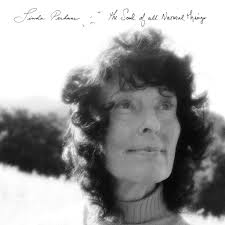Parallelograms, Linda Perhacs’ much lauded and revived 1970 album, was shaped by a miraculous, synesthetic experience – a sudden light and colour in the sky above LA’s Topanga Canyon. Knowing from the get-go how deeply rooted Perhacs’ music is with her experience of her surroundings, one wonders what colours and forms she may have encountered while corralling the atmosphere around her – some 44 years later – in preparation for her second album The Soul Of All Natural Things.
You only really need listen to the softly picked notes of the opening track from each record to hear immediately what four decades have done to the planet. Where Parallelograms‘ ‘Chimacum Rain’ evoked the gentle precipitation of a bright daybreak, the title track opening 2014’s record is rich with contemplative foreboding. There’s sadness and reverence in her breathy tonality as the track unfolds its delicate catalogue of birds, ocean and air. We’ve moved from a point in time where nature held sway, to an anthropocentric present – an ecological mess preparing to bite back.
Having continued to work as a dental hygienist in the lifetime between recordings, Perhacs is maybe as eloquent an authority on this subject as we can hope for; a genuine and sensitive observer of change. There isn’t (and never has been) any commercial drive to her creativity, just a natural process of experiences transmuted through music. Positioning her work outside the sonic frivolity of mere entertainment, it’s clearer than ever that there is a message to impart and transformations to affect.
As beautiful as her compositional tendency is, and as calmly familiar as her voice remains, this record is no easy listen; its purity is unmistakably cut with the frantic energies and uncertainties of 21st century living. The dark warnings of natural might, the anxiety inducing modular crescendo of ‘Intensity’ with its pre-chorus of "no one ever said that this life would be easy"; the rhythmic insistence of ‘Immunity’ attempting to bust through the deafening roar of the daily grind; the spectral hope of ‘When Things Are True Again’. Perhaps the most unsettling thing is the sonic shadow cast by Parallelograms itself, tingling with our ineffable distance from better times past and ringing with nostalgia that dodges a firm grip.
It’s not all dark clouds however; there are simply woven melodies, sweetly sung and full of optimistic lyrical whispers, not to mention an influx of subtle electronica, back-masked vocals, and trip-hop beats that Perhacs has assembled with collaborators Fernando Perdomo and Chris Price who seem mercifully in-tune with the progression of her ideas rather than working to radically subvert or repackage them. It’s a boldly contemporary record whose wily 70s spirit isn’t lost amid the fuzz.
A review of Perhacs’ recent live performance at Cecil Sharp House noted the suspension of cynicism needed to fully inhale the rhetoric of "energies" and the haptic tendency of her particular earth song. This could be true also of the album’s climax, ‘Song Of The Planets’, a swirling eulogy to peace, unity and ecological sentience. But in the end, it only serves to highlight how rare it is to witness something created from a place of unsullied sincerity; a facet that renders Perhacs’ slim oeuvre even more precious.


